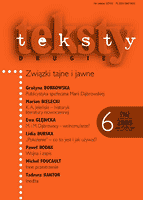Zaczarowana królewna. U źródeł publicystyki społecznej Marii Dąbrowskiej
The Bewitched Princess. Maria Dąbrowska’s social commentaries at their sources
Author(s): Grażyna Borkowska-ArciuchSubject(s): Literary Texts
Published by: Instytut Badań Literackich Polskiej Akademii Nauk
Keywords: Polish Literature; Nacionalism; Antisemitism
Summary/Abstract: This article discusses early commentaries by Maria Dąbrowska, dating 1912-1914. Along with the well-recognised influences of Stanisław Brzozowski or Edward Abramowski, one can find in those texts strong vernacular tendencies, manifesting themselves in, inter alia, her attempts at describing the familiar environment or nativeness of Polish culture. These are accompanied by other threads, sometimes astonishing ones, such as the delicate and level-headed yet clearly present anti-Semitic rhetoric. How come it appeared to such a liberal writer as Dąbrowska was in her young years was? Beside that, she was known in the period of 1918-1939 from her famous anti-anti-Semitic speeches. It seems that in the period preceding World War 1, almost everyone was overwhelmed by the national fever. Bolesław Prus, S. I. Witkiewicz, Aleksander Świętochowski, Władysław Orkan, or E. Wasilewski would use a similar tenor, referred to by Andrzej Walicki as a ‘nationalistic discourse’; and so did Ms. Dąbrowska. This type of utterance was not infrequently getting intermingled with the anti-Semitic idiom. This was one of the ways which the anti-Jewish rhetoric took to penetrate into the political/social-commentary output of the one who was some time later to become famous for her novel Noce i dnie.
Journal: Teksty Drugie
- Issue Year: 2005
- Issue No: 6
- Page Range: 7-17
- Page Count: 10
- Language: Polish

